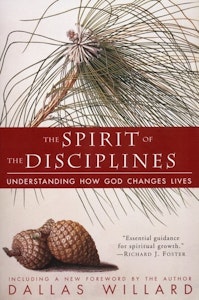Introductory Note:
In The Spirit of the Disciplines, Dallas Willard quotes psychiatrist M. Scott Peck: “There are many people I know who possess a vision of [personal transformation] yet seem to lack the will for it. They want, and believe it is possible, to skip over the discipline, to find an easy shortcut to sainthood. Often they attempt to attain it by simply imitating the superficialities of saints. …[They need to] face the painful fact that they must start at the beginning and go through the middle.” So where do we begin? What, exactly, is required? In this excerpt from chapter 1, Dallas discloses the secret of the easy yoke.
Miriam Dixon
 Excerpt from The Spirit of the Disciplines
Excerpt from The Spirit of the Disciplines
We are saved by grace, of course, and by it alone, and not because we deserve it. That is the basis of God’s acceptance of us. But grace does not mean that sufficient strength and insight will be automatically “infused” into our being in the moment of need. Abundant evidence for this claim is available precisely in the experience of any Christian. We only have to look at the facts. A baseball player who expects to excel in the game without adequate exercise of his body is no more ridiculous than the Christian who hopes to be able to act in the manner of Christ when put to the test without the appropriate exercise in godly living.
As is obvious from the record of his own life, Jesus understood this fact well and lived accordingly. Because of the contemporary bias with which we read the Gospels… we have great difficulty seeing the main emphases in his life. We forget that being the unique Son of God clearly did not relieve him of the necessity of a life in preparation that was mainly spent out of the public eye. In spite of the auspicious events surrounding his birth, he grew up in the seclusion of a simple family in lowly Nazareth. At the age of twelve, as Luke 2:45 tells us, he exhibited astonishing understanding “in the midst of the doctors” in Jerusalem. Yet he returned to his home with his parents and for the next eighteen years was subject to the demands of his family.
Then, after receiving baptism at the hands of his cousin, John the Baptist, Jesus was in solitude and fasted for a month and a half. Afterward, as his ministry proceeded, he was alone much of the time, often spending the entire night in solitude and prayer before serving the needs of his disciples and hearers the following day.
Out of such preparation, Jesus was able to lead a public life of service through teaching and healing. He was able to love his closest companions to the end — even though they often disappointed him greatly and seemed incapable of entering into his faith and works. And then he was able to die a death unsurpassed for its intrinsic beauty and historical effect.
And in this truth lies the secret of the easy yoke: the secret involves living as he lived in the entirety of his life — adopting his overall life-style. Following “in his steps” cannot be equated with behaving as he did when he was “on the spot.” To live as Christ lives is to live as he did all his life.
Our mistake is to think that following Jesus consists in loving our enemies, going the “second mile,” turning the other cheek, suffering patiently and hopefully — while living the rest of our lives just as everyone around us does. This is like the aspiring young baseball players mentioned earlier. It’s a strategy bound to fail and to make the way of Christ “difficult and left untried.” In truth it is not the way of Christ any more than striving to act in a certain manner in the heat of a game is the way of the champion athlete.
Whatever may have guided us into this false approach, it is simply a mistake. And it will certainly cause us to find Jesus’ commands about our actions during specific situations impossibly burdensome — “grievous” as the King James Version of the New Testament puts it. Instead of an easy yoke, all we’ll experience is frustration.
But this false approach to following Christ has counterparts throughout human life. It is part of the misguided and whimsical condition of humankind that we so devoutly believe in the power of effort-at-the-moment-of-action alone to accomplish what we want and completely ignore the need for character change in our lives as a whole. The general human failing is to want what is right and important, but at the same time not to commit to the kind of life that will produce the action we know to be right and the condition we want to enjoy. This is the feature of human character that explains why the road to hell is paved with good intentions. We intend what is right, but we avoid the life that would make it reality.
…So, ironically, in our efforts to avoid the necessary pains of discipline we miss the easy yoke and light burden. We then fall into the rending frustration of trying to do and be the Christian we know we ought to be without the necessary insight and strength that only discipline can provide….
So, those who say we cannot truly follow Christ turn out to be correct in a sense. We cannot behave “on the spot” as he did and taught if in the rest of our time we live as everybody else does. The “on the spot” episodes are not the place where we can, even by the grace of God, redirect unchristlike but ingrained tendencies of action toward sudden Christlikeness. Our efforts to take control at that moment will fail so uniformly and so ingloriously that the whole project of following Christ will appear ridiculous to the watching world. We’ve all seen this happen.
So, we should be perfectly clear about one thing: Jesus never expected us simply to turn the other cheek, go the second mile, bless those who persecute us, give unto them that ask, and so forth. These responses, generally and rightly understood to be characteristics of Christlikeness, were set forth by him as illustrative of what might be expected of a new kind of person — one who intelligently and steadfastly seeks, above all else, to live within the rule of God and be possessed by the kind of righteousness that God himself has, as Matthew 6:33 portrays.
Instead, Jesus did invite people to follow him into that sort of life from which behavior such as loving one’s enemies will seem like the only sensible and happy thing to do. …Oswald Chambers observes: “The Sermon on the Mount is a statement of the life we will live when the Holy Spirit is getting his way with us.”
Excerpted from Dallas Willard’s The Spirit of the Disciplines (pp.4 – 8). Courtesy of HarperOne (New York, 1998).
Text First Published October 1988 · Last Featured on Renovare.org May 2024


